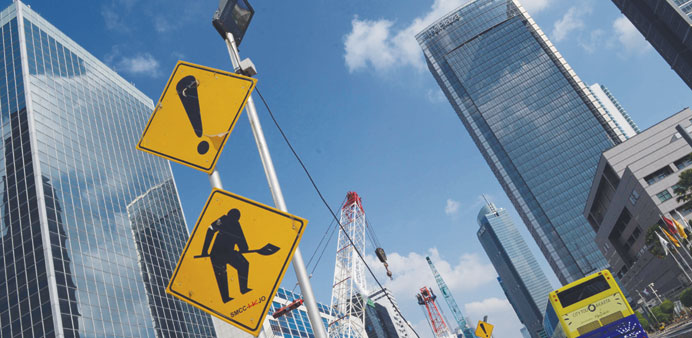Warning signs are posted on the construction site of Indonesia’s mass rapid transit in Jakarta. Indonesian growth slipped to its slowest pace for almost five years in the second quarter, official data showed yesterday.
Reuters
Jakarta
Indonesia’s economy unexpectedly failed to gain traction in the second quarter due to weak investment and exports, underscoring problems the new president will need to deal with to get the country’s growth rate back up.
While annual growth remained relatively robust at more than 5% for the quarter, it was below expectations and the weakest pace for Southeast Asia’s largest economy since late 2009, adding pressure on Joko Widodo to fast-track much-needed reforms once he takes office in October.
The president-elect has made revival of Southeast Asia’s largest economy his top priority, promising to make life simpler for investors and to beef up the country’s threadbare infrastructure.
The statistics bureau said the annual growth rate for April-June was 5.12%, compared with the median forecast of 5.30% in a Reuters poll and the previous quarter’s revised pace of 5.22% (it was initially reported as 5.21%.)
“Hopes for a recovery largely rest on the new government,” said Gareth Leather, economist at Capital Economics. “However, it is far from clear if the new president will be able to live up to investors’ lofty expectations.”
Indonesian growth has been trending down in the past two years. One factor has been weak exports. This year, mining exports have fallen significantly because of Indonesian rules banning shipments of mineral ore.
In the latest quarter, there was a trade deficit of $2.20bn in April-June, following a surplus of $1.07bn in the first three months of the year.
Leo Putra Rinaldy, economist with Mandiri Sekuritas in Jakarta, said the slowdown in the second quarter appeared to be “mainly caused by slowing investment. Political conditions in the second quarter may have caused some businesses to hold their investments and tightening in monetary policy by the central bank is also starting to materialise, especially in the property sector.”
In the second quarter, government consumption was down 0.71% from a year earlier, indicating state spending slowed in the period. In January-March, such consumption rose 3.58% period on an annual basis.
The latest quarter included the campaign to elect Indonesia’s new president. Some economists thought campaign spending would add enough to domestic consumption to lift the quarter’s growth pace about that of January-March.
Domestic consumption, which accounts for more than half of GDP, has remained solid even though inflation soared last year after fuel prices were hiked. The central bank has maintained its tight monetary policy since last year to aid the rupiah, cool inflation and contain the country’s large current account deficit.
Between June and November 2013, Bank Indonesia raised the benchmark interest rate by 175 basis points to 7.5%. The rate has been on hold since then, and most economists expect it to remain on hold the rest of this year.
The central bank’s next policy meeting is on August 14. Most economists believe the benchmark rate will remain on hold the rest of this year. Even though the inflation rate has fallen significantly this year, Indonesia again needs to cut its costly fuel subsidies, which will raise energy prices – and quite likely the inflation rate.
“Joko Widodo cannot do much to boost growth this year,” said Eric Sugandi, economist at Standard Chartered in Jakarta.
The disappointing second quarter growth rate is likely to cause economists to cut their full-year growth forecasts. Credit Suisse, noting that domestic demand growth is “likely to moderate further”, said yesterday the second half will be softer, with growth in the fourth quarter below 5%.
Analysts expect only a small increase in foreign investment after the presidential election. A lack of roads, ports, electricity and other basic services, along with corruption in the bureaucracy, is beginning to disenchant foreign investors, essential for the resource-based economy to grow. Encouragingly to many, Widodo is the first businessman to become president of Indonesia. Most of its six previous leaders have come from the political elite.
“Joko Widodo’s economic policy will not show its impact on the economy this year because he will only take office in October, but at least investments will start to pick up post-election, which should be good for the economy in the second half,” Rinaldy said.

